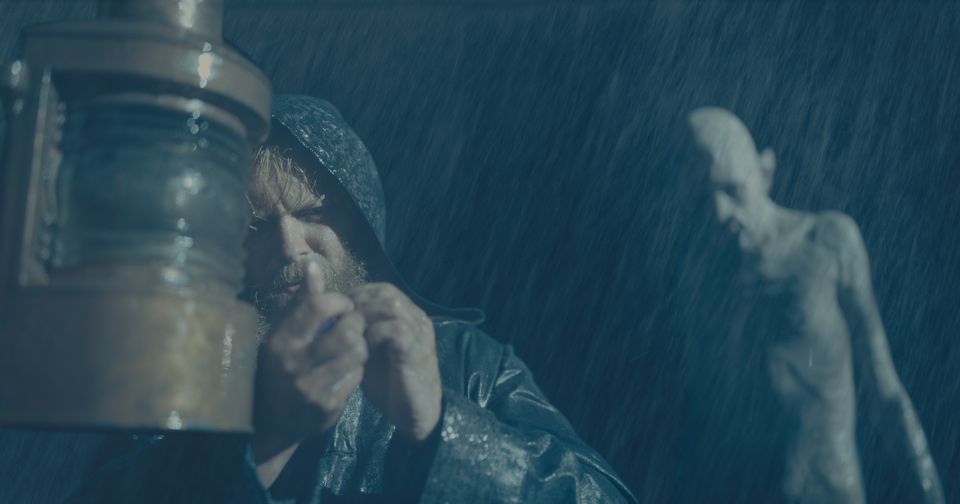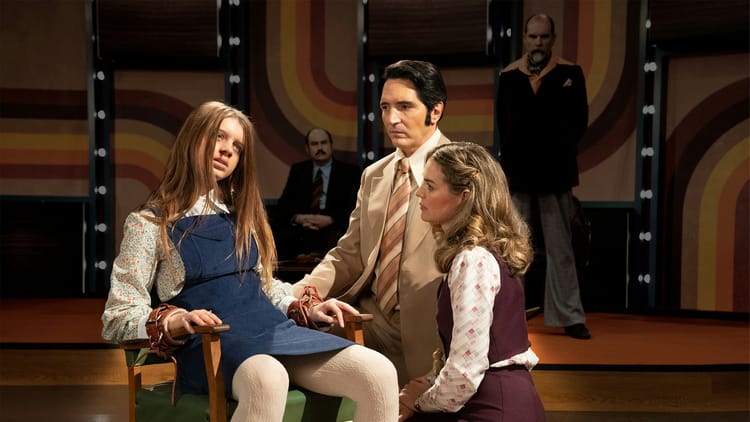The Last Voyage of the Demeter

"The Last Voyage of the Demeter" starts with an opening text screen, informing the audience that the Demeter made its final voyage from Bulgaria to England, arriving mysteriously with no survivors onboard. In literature, we call this dramatic irony, where "the audience’s or reader’s understanding of events or individuals in a work surpasses that of its characters." Dramatic irony usually serves to create a sense of dread in its audience, who are aware of the coming tragedy but unable to intervene. It's a type of engineered helplessness, exceptionally common in horror. It's a typical trick of the trade, one that if done well, can have audiences at the edge of their seat by generating some anxiety without giving the whole game away. By balancing the known and the unknown, by telling us what happens, the audience is meant to be intrigued into figuring out the who, why, and how.
Before the Demeter casts off from Bulgaria, we are reminded no less than five times that something bad is going to happen to the ship. We are reminded by the crew, by the Bulgarians dropping off cargo they refuse to touch, by the new hire that quits after seeing the dragon's crest on a locked crate. All of this could raise some tension, titillating the audience with the slightest of mysteries. Because to warn us this many times of the coming danger, we assume the filmmakers must be confident that they can surprise us along the way. There may be something in the "how" or "who" they can shock us with, even if that isn't the reason behind the Demeter's last voyage. Because, boldly enough, the film's opening crawl explicitly outlines why the Demeter failed. For it tells us that this story comes directly from "the captain's log in Bram Stoker's novel, "Dracula.""
We know why this is the Demeter's last voyage. So perhaps the mystery comes out from the "how": how do the events unfold aboard this cursed ship? Unfortunately, "The Last Voyage of the Demeter" has no secrets in its hold. It's a constant competition to see whether the film's script can out-bland its cinematography. There is hardly an interesting shot or sound cue that isn't completely cliche; The movie is littered with jump scares, each cheaper than the last. There is no sense of rising tension, of palpable terror, because the movie's got one trick and it already told us what that was in the opening crawl. And if that wasn't enough, the movie then fully shows us Dracula in its first ten minutes, now removing any opportunity for the audience to imagine some terrible creature lurking in the shadows. Rather than withhold his visage and save it for a great reveal, the movie dumps Dracula's appearance on us as if the filmmakers are as disappointed as we are in his uninspiring design.
Dramatic irony works if we know the ending but cannot necessarily predict how we get there. "The Last Voyage of the Demeter" is thoroughly predictable at every moment, with each death telegraphed clearly and plainly. And that brings us to the "who" of the film, because predictable deaths wouldn't be a problem if we cared about the Demeter's crew. But unsurprisingly, the film's characters are hollow and uninteresting, which is frankly an achievement considering the film's hefty two hour length.
Despite each getting a substantial amount of screen-time, the film's eight or so characters are largely devoid of any remarkable characteristics or discerning traits, other than their constantly wavering accents. The crew drop like flies beneath Dracula's fangs with little impact, because often, you have no idea who is the person who just got their throat ripped out. You have an outline of a person, but nothing beyond their purported nationality and their occupation, which is usually, sailor. The only character given the slightest bit of backstory is its protagonist, Dr. Clemens, played by Corey Hawkins. Hawkins does what he can with extremely mediocre writing, but no actor could pull off this film's hamfisted approach to 19th century race-relations. It almost had me wishing the filmmakers had been consistent in their limited reach, choosing to disappoint in every regard rather than attempt to strike some sort of contemporary chord.
So now with the why, how, and who covered, we're led to another why. Why make this movie at all? What drove this production? Why take my favorite part of the novel and adapt it into this lifeless husk? Why personally attack me with this film? Why bother with dramatic irony if you don't have a single card up your sleeve?And why should anyone else go watch this film? There are no answers to these questions, though I do have a smidgen of good news. The audience isn't completely helpless in witnessing the tragic fate of the Demeter. They can intervene by doing the one thing the crew chose not to do. They can walk out, and watch a better movie instead.




